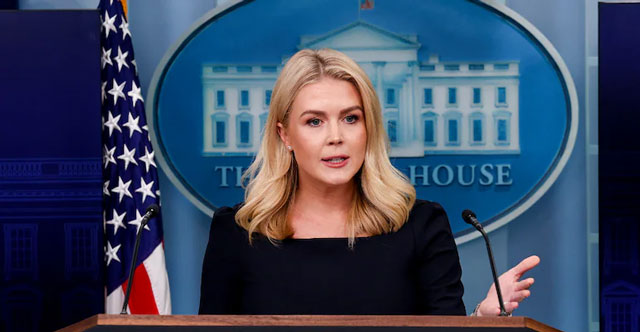Daijiworld Media Network- Washington
Washington, Jul 22: In a controversial move that has reignited the debate on press freedom in the United States, the White House on Monday barred The Wall Street Journal (WSJ) from accompanying President Donald Trump on his upcoming visit to Scotland. The decision follows the newspaper’s recent report alleging that Trump had once penned a lewd birthday message to late financier and accused sex trafficker Jeffrey Epstein.
The report, which Trump strongly denies, has not only triggered a $10 billion defamation lawsuit against the WSJ and its owner Rupert Murdoch, but also intensified friction between the Trump administration and sections of the media.

“This decision is in direct response to the WSJ’s fake and defamatory conduct,” said White House Press Secretary Karoline Leavitt, confirming that the Journal will not be among the thirteen approved outlets aboard Air Force One for the President’s trip. “There is no guaranteed right for any outlet to travel with the President,” she added.
The exclusion marks the second time since February that the Trump administration has blocked a major news organization from critical press events — Associated Press journalists were previously denied access to multiple briefings.
Trump is set to depart for Scotland this weekend, where he owns two golf resorts and is scheduled to meet newly elected UK Prime Minister Keir Starmer. The White House has not commented on whether the ban could extend to future presidential events.
The WSJ article at the heart of the controversy claimed that Trump, in 2003, sent Epstein a suggestive birthday greeting illustrated with a naked woman, referencing a mysterious “secret” between the two men. Trump’s lawsuit calls the report "baseless character assassination."
Epstein, a former associate of several high-profile figures including Trump, was found dead in a Manhattan jail in 2019 under what was officially ruled as suicide while awaiting trial for sex trafficking of minors. His death fueled widespread conspiracy theories, especially among Trump’s far-right MAGA base, some of whom now demand the full disclosure of so-called “Epstein Files.”
Adding to the tension, Attorney General Pam Bondi—a Trump appointee—recently stated that the Department of Justice has found “no evidence” of Epstein maintaining a blackmail “client list,” a claim that has been met with skepticism in some political circles.
Criticism of the White House’s media restrictions has come swiftly from press advocates. Weijia Jiang, president of the White House Correspondents’ Association (WHCA), called the move “deeply troubling.”
“This attempt by the White House to punish a media outlet whose coverage it does not like is an attack on the First Amendment,” Jiang stated. “Such government retaliation against the press should concern every citizen who values democracy.”
Earlier this year, the Trump administration revoked the WHCA’s authority to determine press access to certain presidential events — a nearly century-old tradition. “I’m calling the shots now,” Trump had declared at the time.
As Trump strengthens his grip on White House press access and control, concerns about the erosion of journalistic freedom and democratic accountability are only growing louder.